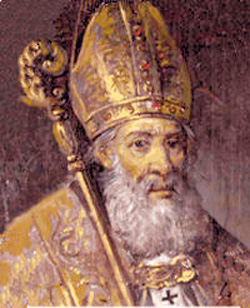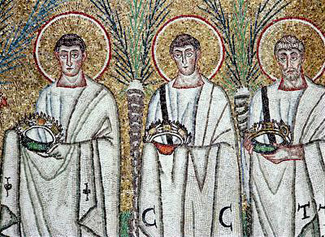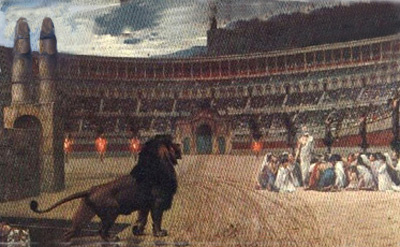 |
The Saint of the Day
St. Eusebius of Vercelli – December 16
Prof. Plinio Corrêa de Oliveira
Biographical selection:
Eusebius (283-371) was a native of Sardinia, Italy. His father was said to have died a martyr. After that his mother moved to Rome where Eusebius spent his childhood and became a lector.
Later, he went to Vercelli, in the Piedmont, where he served the church so well that he was chosen to be the first Bishop of the city. He took part in a council in Milan in 355, convened by Emperor Constantius, who was at Arles in Gaul. Supported by the Emperor, the Arian bishops planned to condemn St. Athanasius as a heretic at this synod.

St. Eusebius, Bishop of Vercelli |
St. Eusebius, along with St. Dionysius, strongly opposed this unjust condemnation. The Emperor tried to oblige St. Eusebius to sign it, but he vehemently refused. As a result, he was sent into exile, first to Scythopolis in Palestine. There he was persecuted by the Arian bishop Patrophilus, who ordered St. Eusebius to be imprisoned and denied him food for some time. The Arians also dragged him half-naked through the streets, mocking and insulting him.
Later, he was exiled to Cappadocia and then, finally, to Thebaid in Upper Egypt. During all these trials he remained militant in defense of the true Faith, corresponding with other Bishops and exhorting them to be faithful.
When Constantius died in the year 361, the new Emperor Julian allowed all the exiled Prelates to return to their sees. St. Eusebius went to Alexandria to consult with St. Athanasius about convoking a synod, which in 362 was held there under their joint leadership.
At its close, he went to Antioch and Illyricum, confirming in the Faith those who were wavering and bringing back those who had gone astray. In 363 he returned to Italy, where he assisted the zealous champion of the fight against Arianism in the Western Church, St. Hilary of Poitiers. Finally he returned to Vercelli after a long absence, where he died on August 1, 371.
Because of the sufferings for the Faith he endured during his life, the Church honors him with the title of martyr.
Comments of Prof. Plinio:
The Church considered St. Eusebius a martyr even though he did not die as such. The selection mentions some of his sufferings. He endured moral and physical suffering of all kinds: pressure from the Emperor, insults from the Arian bishops, exile, and persecution. He was dragged through the streets, thrown in jail and left without food. He faced an organized campaign of calumnies and persecutions that transformed his life into one of ignominy, a true martyrdom.

Procession of the Martyrs from the wall of Sant'Apollinare Nuovo, Ravenna, Italy |
We see in his life the ferocity of the enemies of the Church against those who truly serve her. This gives us a criterion to discern who is a true son of the Church.
Unfortunately we do not always recognize who is a true son of the Church. Our Lord said in the Gospel that the sons of darkness are shrewder and more astute than the sons of light. But there is a pattern that the sons of darkness always instinctively follow that we can discern.
• When they praise someone in the Catholic ranks, this person is not good.
• When they attack someone on the Catholic front, we have to distinguish if it is a tactic to give prestige to one of their allies, or if it is an attack to destroy. In the latter case, we can be sure that the assailed person is good.
If we make these distinctions carefully, we can discern who is good or bad. But generally speaking, when a person is attacked by the sons of darkness, it is because he is good.
The life of St. Eusebius is a clear example of this rule. He was a man with many qualities and virtues that deserved all praise. Instead, after the first phase of his life in Vercelli, he was hated with ferocity because he was a true son of the Church.
His life also shows us that the enemies do not hate us for our defects. They don’t care about defects. They hate us because we represent the light, and they hate light, truth, virtue, and goodness. They do not admire any of our qualities or virtues. They hate them insofar as they serve the good cause. They only make eulogies of us when they want to buy us.
I remember a very good Catholic whose spiritual life began to decline. When he would meet some enemy of the Church, he would receive eulogies. After many such praises from different persons, he - who knew this rule well - commented to me: “I must be in a bad state, because I am receiving eulogies from the sons of darkness.” He realized his misstep and returned to the good path.
Another lesson we can take from the life and death of St. Eusebius is how the Church recognizes that moral sufferings can be equal or superior to martyrdom. In the history of the martyrs, we are rightfully impressed reading about such terrible sufferings as being dilacerated and devoured by a lion, tiger or panther.

The martyrs in the Coliseum |
When I visited the Coliseum I was shown the small prison where martyrs spent their last night before entering the arena. They spent the night there praying and waiting for morning when they would be a spectacle for the populace. The prison was near the cages of the beasts, so that all night the famished animals could smell the human flesh and snarl in anticipation of eating them. It was a terrible suffering.
In the day-to-day life, however, there are tragic and most difficult sufferings that can be compared to those of the martyrs in the Coliseum. Indeed, for one to be ridiculed by his own family and friends because he is a Catholic who does not compromise, to be criticized by the clergy as unfaithful when he is fighting against Progressivism to save the Church, to be despised by his supervisors and set aside in his career because he is a counter-revolutionary – these are some of the moral sufferings we are called to support. To bear this day after day, year after year, without making concessions to error and the Revolution, can be compared to martyrdom.
We have to endure many of these sufferings during our lives. We should remember that it is proper for an apostle to undergo torments comparable to what the martyrs suffered in the Coliseum. To be an apostle of the Counter-Revolution implies torments that can be compared to those of martyrdom. We should love this martyrdom and value it as the greatest honor of our lives. Because it is through suffering that our blood can be mixed with the infinitely precious Blood of Our Lord to assist in the salvation of souls.
Therefore, we should understand that it is normal for Our Lady to send us sufferings. It is also understandable that these sufferings at times be terrible. When they come, we should have prepared our souls so that we are not shocked or surprised. We should be ready to accept the great moral sufferings to be faithful to Our Lady.
Let us ask St. Eusebius to give us the grace to understand the value of this moral martyrdom and to give us an enthusiasm for it. Except for prayer, there is nothing more valuable in life than suffering.


  | | Prof. Plinio Corrêa de Oliveira | |
The Saint of the Day features highlights from the lives of saints based on comments made by the late Prof. Plinio Corrêa de Oliveira. Following the example of St. John Bosco who used to make similar talks for the boys of his College, each evening it was Prof. Plinio’s custom to make a short commentary on the lives of the next day’s saint in a meeting for youth in order to encourage them in the practice of virtue and love for the Catholic Church. TIA thought that its readers could profit from these valuable commentaries.
The texts of both the biographical data and the comments come from personal notes taken by Atila S. Guimarães from 1964 to 1995. Given the fact that the source is a personal notebook, it is possible that at times the biographic notes transcribed here will not rigorously follow the original text read by Prof. Plinio. The commentaries have also been adapted and translated for TIA’s site.
|
Saint of the Day | Home | Books | CDs | Search | Contact Us | Donate

© 2002- Tradition in Action, Inc. All Rights Reserved
|
 |

|